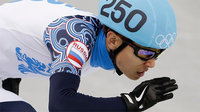Viktor Ahn's 4 medals: Not good enough for South Korea
By Jeong Qbeen

In the 2014 Sochi Olympics, South Korea achieved five gold medals in short-track events, a seemingly impressive number. However, because of corruption, factionalism and favoritism at the Korea Skating Union (KSU) this medal count was lower than what our country could have gained.
Mismanagement at the KSU caused South Korea's loss of its best short-track skater, Ahn Hyun Soo, now known as Viktor Ahn in Russia, his newly adopted country. "Everyone said I was finished. I proved them all wrong."[1]
What made a leading Korean athlete in men's short-track become a Russian citizen? Why did South Korea let him go? Russia rescued Ahn from SKU's disastrous management and persuaded him to come to Russia.
The KSU is divided in two parts. One is situated in the Korea National Sport University and the other is rooted in a group of other universities. The two always compete for authority, and the power changes hands regularly. When Viktor was an athlete in South Korea, he actually belonged to the inferior side (Korea National Sport University) of the two groups in KSU.
Coaches and administrators from the other side of Viktor envied him because he took away opportunities from their side to win games. They even blocked him from entering international competitions.
Viktor was not able to train with his male teammates and couldn't even stay in camp for training. His father said the situation became so serious that Viktor trained with the women's team for the Vancouver Olympics.[2]
Outrageously, coaches directed their skaters to interfere with Viktor in races so as to eliminate him from the tournament! (At the ISU Short Track Speed Skating World Cup in 2006, the 1,000m final game proved it.) He suffered much difficulty being selected for the national team although he had outstanding ability.
In 2008 before the team was selected for the 2010 Vancouver Olympics, Viktor suffered a serious knee injury. However, KSU didn't care about his condition and didn't provide him financial support. KSU operates welfare funds to help of Korean players to improve, treat injuries, celebrate events and fund general operations.[3] But KSU didn't provided any of the funds for Viktor so he had to personally pay all of the cost for his rehabilitation. This mismanagement of funds is one of the reasons that contributed Viktor's departure.
There is also much criticism about giving prize money to skaters in South Korea. However, Russia rewarded him for his performance. According to Russian Prime Minister Dmitri Medvedev told the sports minister to give Viktor a home in Moscow and 5 million dollars from the Russian Federation and Moscow after he won the Sochi Olympics.[4] This generous reward reflects the value Russia places on its athletes.
"I only came here (to Russia) to continue playing the sport I love,"[5] Viktor said. He was driven away not because of his ability, but because of South Korean factionalism, favoritism toward others, and corruption.
KSU reaped what they have sown. Viktor is gone and he is no more a Korean. Russia wisely grabbed an opportunity to take him in. And Russia finished the Sochi Olympics successfully. On the other hand, KSU forgot why they exist. It is a shame that KSU, an organization responsible for taking care of its skaters on the team, excluded a dynamic skater due to bureaucratic infighting. The next winter Olympics is going to take place in Pyeongchang, South Korea. For a successful event, South Korea should learn from Russia. Countries that treat their athletes with respect will be rewarded with medals.
Jeong Qbeen
Hankuk University of Foreign Studies
South Korea
[1] https://www.reuters.com/article/2014/03/20/us-olympics-shorttrack-korea-idUSBREA2J0VB20140320
[2] https://www.reuters.com/article/2014/03/20/us-olympics-shorttrack-korea-idUSBREA2J0VB20140320
[3] https://www.skating.or.kr/intro/data/620.pdf
[4] https://english.chosun.com/site/data/html_dir/2014/02/24/2014022401660.html
[5] https://english.chosun.com/site/data/html_dir/2014/02/24/2014022401660.html
Subscribe to Pravda.Ru Telegram channel, Facebook, RSS!





